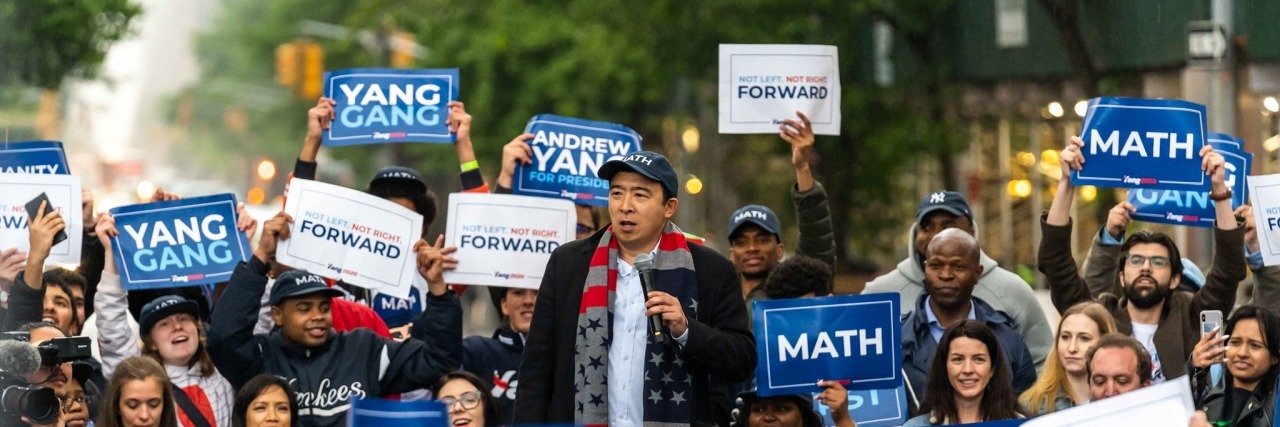For the first time this campaign season, businessman Andrew Yang has provided more detailed information regarding a variety of disability-related policies — from education and employment to immigration and community integration. Responding to a questionnaire by the disability advocacy group RespectAbility, businessman Andrew Yang outlined his views.
In responses to 15 questions submitted by the organization concerning people with disabilities, Yang noted the stigmas that exist that “incorrectly label them as liabilities.” He pledged to “incentivize businesses to hire people with disabilities by offering tax benefits to those that provide adequate job training for people with disabilities.”
Regarding immigration, he called for a reversal of the public charge rule that impacts immigrants with disabilities. “In addition to making sure the U.S. does not discriminate against immigrants with disabilities at the border, we must also ensure that immigrants are sufficiently cared for throughout the immigration process,” Yang added.
Yang’s questionnaire responses also indicate that he has hired people with disabilities on his campaign, including a full-time policy advisor, and “has ensured that necessary accommodations have been made readily available for those who needed them” including the ability to work from home, have accessible transportation options and accessible desk options.
The Yang campaign responses also noted they made website accessibility an early priority. The Miami Lighthouse for the Blind and Visually Impaired confirms this, having found Yang’s website to be the most accessible website of all of the presidential candidates, as of December 16, 2019.
Yang also pledged to fully fund the Individuals with Disabilities Education Act (IDEA) at 40 percent and support the Disability Integration Act (DIA). IDEA, which covers educational funding for children with disabilities from birth through high school graduation or age 21, whichever comes first, has yet to be fully funded by the federal government since it was first passed in 1975. Regarding DIA, he said, “community-based services are less expensive and more effective, allowing people with disabilities to remain integrated and to participate in their communities.” Yang also noted that “accessible technology is key to community integration,” including employment, healthcare and transportation.
Yang is the father of two sons, one of whom is on the autism spectrum, leading to Yang developing autism-specific plans. His large-scale disability platform on his website focuses on “care for people with disabilities,” and he has come under criticism by many members of the disability community for talking about his son with “special needs,” even after RespectAbility’s Eric Ascher, who is on the autism spectrum himself, spoke with Yang in November about better language to use. The responses to this questionnaire, however, use the word disability, showing the campaign is responding to criticism and adapting.
Yang discusses his signature proposal, a freedom dividend of $1,000, as a solution to many of the questions. However, while people with disabilities who receive Social Security Disability Insurance (SSDI) alone would receive the dividend, those who receive both SSDI and Supplemental Security Income (SSI) would not receive it. People would have to choose between SSDI and SSI if they want this universal basic income.
According to research conducted by RespectAbility in 2018, 74 percent of likely voters either have a disability themselves or have a family member or a close friend with disabilities. The upcoming elections and their results will have an impact on people with disabilities, so it is important to become familiar with the candidates’ thoughts on certain issues.
“Candidates for office ignore the disability community at their peril,” said former U.S. Representative and Dallas Mayor Steve Bartlett. Bartlett, who was a primary author of the Americans With Disabilities Act of 1990, is the chairman of RespectAbility.
“The unfortunate fact is that stigma is still a driving factor in why two-thirds of people with disabilities are unemployed,” added Lauren Appelbaum, managing editor of The RespectAbility Report. “It is vital for the democratic process to be open to all people and that includes people with disabilities. By having meaningful disability employment policies, candidates can show their campaigns truly include the 1-in-5 people living in America with a disability.”
RespectAbility is nonpartisan and does not endorse candidates. The questionnaire is purely for educational purposes. RespectAbility has reached out to all of the presidential campaigns and will be posting all responses on The RespectAbility Report.
Image via Facebook.

